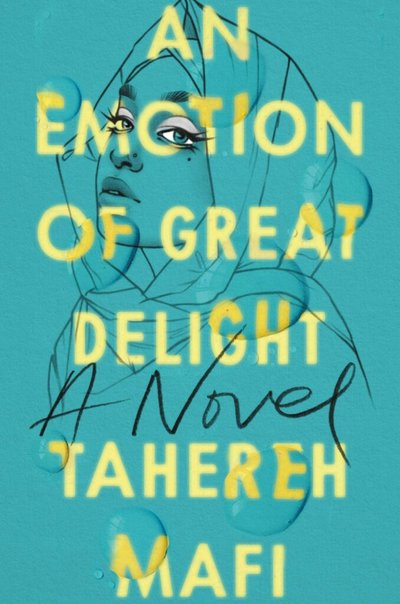Review by Eshaan Mani, high school sophomore, Houston, Texas
Living between cultural lines has never been easy. Doing so in a time of conflict and prejudice while coping with loss is even more difficult.
Shadi, the protagonist of Tahereh Mafi’s novel "An Emotion of Great Delight ", is an Iranian-American girl living in New York City in 2003. Her brother Mehdi recently died in a car accident, her father is dying, her best friend Zahra is shunning her and Shadi is developing a romance with Zahra’s brother.

In the midst of negotiating a broken heart, Shadi must navigate a city angry after September 11, with many ready to blame any Muslim for the violence.
She goes through grief, joy, hope and desperation. But when her emotions boil over, Shadi internally combusts.
So as not to place a burden on anyone around her or draw the attention of racists, she learns to “reduce [her] entire person to a nonevent” and “ignore the sharp pain that accompanied the success of [her] disappearing act.”
Skeptical readers may remark that there seems to be quite a lot going on in a short period of time: tragedy upon tragedy piling up in just a few weeks. Readers see Shadi sorrowfully walking to school each day, holding her grief quietly within her heart. She keeps seeing her brother’s accident, keeps pondering whether she hates her father for being sick and keeps fading into the background.
Despite the overwhelming circumstances Shadi must bear, author Tahereh Mafi’s way of representing profound emotion in poetic language that is engaging, vivid and the perfect choice for Shadi’s character. For example, Shadi describes her changed personality:
Shadi’s name, which means “joy” in Persian, carries a bit of irony to it, considering that she’s drowning in sorrow but trudging forward with a placid expression. Mafi blends Iranian culture into her story, including the Farsi language, especially in scenes when Shadi is speaking to her parents. I wish more authors depicting diverse stories added native languages to their stories — it adds more credibility and melody.
"...My sadness had made me noteworthy. Beautiful. Had imbued in me a kind of dignity, a weight I could not uncarry. I knew this because I heard it all the time, heard it from old ladies at the mosque who praised me for my still lips, my folded hands, my reluctance to smile." — from Tahereh Mafi's "An Emotion of Great Delight"
Shadi’s relationship with her Muslim faith emerges as another major theme, as she experiences waves of skepticism and ponders the value of traditions she’s grown up with. Her questioning leads to contradictions. Though she wears a hijab and visits the mosque frequently, she also smokes, which is haram (forbidden by Islamic law).
More interestingly, she seems committed to Iranian traditions like "khastegari" (traditional courtship) even when she falls in love with a boy.
The book, though marketed as a story of post-9/11 America, seems timeless. It could have taken place in 2022 to the same effect. For example, even today, young Muslim-American girls who wear a hijab can feel othered in society; they frequently face racism for their faith. That, to me, is tragic: the inner turmoil, external conflicts and identity struggles of children of color hasn’t changed too significantly over the past two decades.
"An Emotion of Great Delight" provided me with a clearer view into the lives of Muslim teenagers and their relationship with their culture. As an Indian American, I could identify with some aspects of Shadi’s struggle to find her place living between cultural lines — sometimes she feels like she’s leading two lives — but others I had never considered.
"The book, though marketed as a story of post-9/11 America, seems timeless. It could have taken place in 2022 to the same effect."
Throughout the book, Shadi lives many lives, depending on where she finds herself between cultural lines: the one inside her head, where she filters out all the bigotry, lets some sadness through and allows herself to fall into passionate love; the one she shows to others, where she’s an impregnable wall of solitude; and the one she lives at home, where she’s a quiet but obedient daughter, making tea and dutifully studying to make her parents proud.
Mafi also dives into some difficult topics here like grief and mental health after loss, representing with brutal honesty the desperation and contradicting emotions of grief. While Shadi copes quietly, stockpiling her anguish until she bursts, Shadi’s mother engages in self-harm.
Readers hoping for a redemptive ending or tidy ending may be disappointed. Some readers may feel deprived of a clear guide to healing. But I suppose that in this way "An Emotion of Great Delight" is reflective of life; you either get closure or keep waiting for it.
"An Emotion of Great Delight" is a great read for young Muslim-Americans or anyone seeking to learn more about life between cultural identities. In classrooms, history, English and even psychology teachers trying to help students understand post-9/11 US, the experience of people of color in the U.S., mental health, or recovering from grief will enjoy this book as well.
"An Emotion of Great Delight" is recommended by the School Library Journal for grades nine and up.

Eshaan Mani is a sophomore at The Kinkaid School in Houston, Texas, and possesses a passion for storytelling across different media. In his free time, he enjoys filming and editing videos, playing an Indian drum called the dhol and learning wherever, whenever and with whatever he can. He also devotes time to volunteering with nonprofit organizations, especially those focused on literacy and education.


